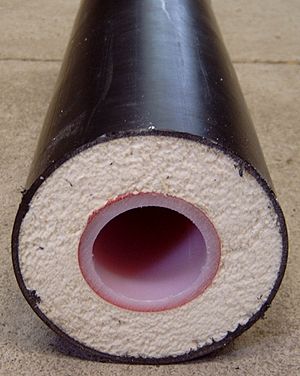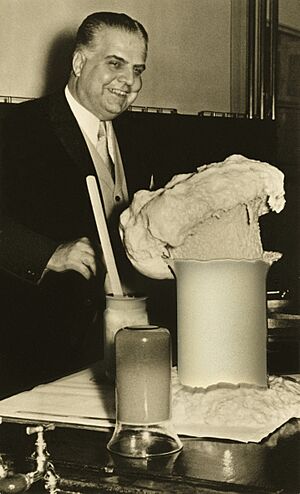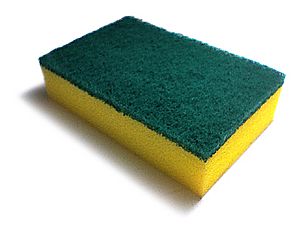Polyurethane facts for kids
Polyurethane is a special type of plastic. People often call it PU or PUR for short. It's made by mixing two main ingredients: a chemical called an isocyanate and another called a polyol.
This material is used all over the world. In 2008, over 12 million metric tons of polyurethane ingredients were used. Its use grows by about 5% each year.
Contents
When Did Polyurethane First Appear?
The story of polyurethane started a long time ago. In the 1930s, scientists were trying new ways to mix chemicals. They found a way to make a new plastic. This plastic used isocyanates and polyols as its main parts.
A German scientist named Otto Bayer did a lot of the early work. He helped make polyurethane useful for many things. The first patents for polyurethane were filed around 1937.
How Is Polyurethane Made?
Making polyurethane is like mixing two special ingredients. These ingredients are called isocyanates and polyols. When they mix, a chemical reaction happens. This reaction creates long chains of molecules. These chains link together to form the polyurethane.
The final polyurethane can be different depending on the ingredients. Other things can be added too. These extra parts can change the color, how flexible it is, or how hard it feels. It's like adding different spices to a recipe. Each one changes the final taste!
Different Types and Uses of Polyurethane
Polyurethane comes in many forms. Each form has its own special uses. Here are some examples:
Flexible Foam: Soft and Comfy
This type of polyurethane is soft and squishy. You can find it in your furniture cushions, mattresses, and pillows. It's also used in car seats. Flexible foam is made to be soft and comfortable. It provides good cushioning. Millions of tons of this foam are made each year.
Rigid Foam: Strong and Insulating
This polyurethane is much harder and denser. It's often used as insulation in buildings. It also helps keep refrigerators cold. Its great insulating power saves energy. It helps keep homes warm in winter and cool in summer. Rigid foam is also used to protect fragile items when they are shipped.
Elastomers: Stretchy and Strong
These materials feel like rubber. They are strong, last a long time, and are flexible. You can find them in shoe soles, wheels, and seals. Elastomers can stretch and bend many times without breaking.
Coatings: Protecting Surfaces
Polyurethane can also be used as a coating. It protects surfaces from scratches and wear. It can also make things look beautiful. Polyurethane coatings are used on floors, furniture, and even cars. It forms a hard, protective layer.
Castings: Making Shapes
Polyurethane can be poured into molds. This lets it create different shapes and objects. It's used to make things like wheels, gears, and other machine parts.
Polyurethane and the Environment
Making and getting rid of polyurethane can affect the environment. But new ways of making it are more eco-friendly. Some companies are making polyurethanes from plants. This uses renewable resources instead of oil. Recycling polyurethane is also becoming more common. Some companies are finding ways to reuse polyurethane waste.
Polyurethane in Your Daily Life
You probably see polyurethane every day. You might not even know it! Think about your shoes, your furniture, your car, or your refrigerator. Many of these things might have polyurethane in them. It's a very useful material. It plays a big part in our modern lives.
Images for kids
See also
 In Spanish: Poliuretano para niños
In Spanish: Poliuretano para niños
 | Georgia Louise Harris Brown |
 | Julian Abele |
 | Norma Merrick Sklarek |
 | William Sidney Pittman |












